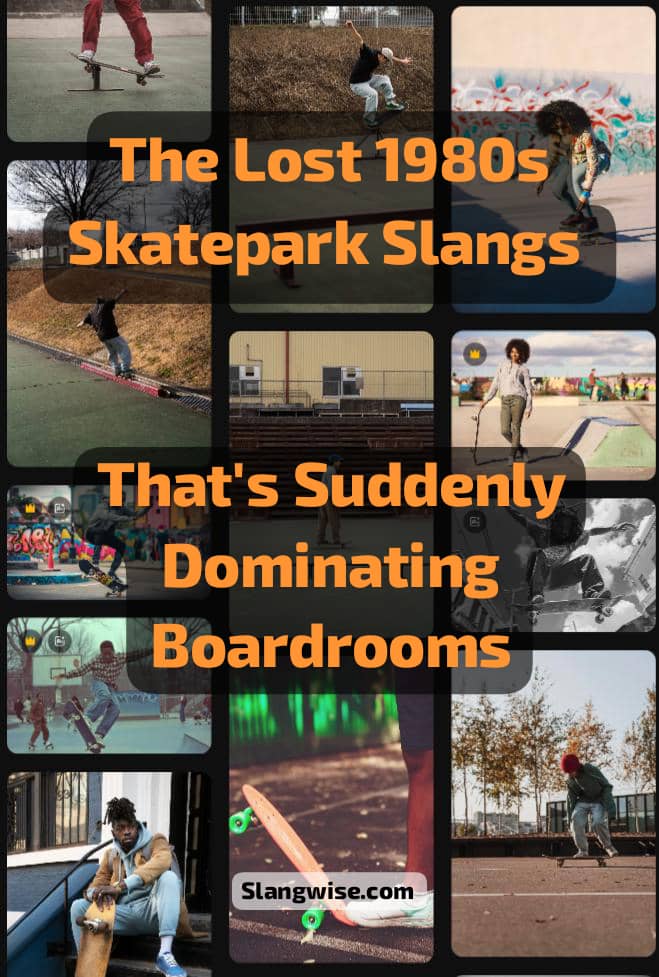Remember the loud skateparks of the 1980s? The grinding sounds, the shouts? Back then, skaters had their own special words.
slang words like sick (meaning awesome), gnarly (meaning intense or difficult), bail (meaning to give up or back out), and shred (meaning to do something really well or destroy it) weren’t just talk. They were badges of belonging in a world far away from offices.
Fast forward to today. Walk into a modern office, join a Zoom call, or check Slack. Suddenly, you hear things like:
- “That sales report is sick!”
- “We need to shred this outdated policy.”
- “Don’t bail on the client meeting!”
- “I’m stoked about the new project!”
The rough-and-tumble slang of 1980s skateparks is now popping up in meetings and emails. Why is this happening?
Table of Contents
Why Skate Slangs Are Hitting the Office:
- The Bosses Grew Up Skating (or Watching): Many people running companies today (Gen Xers) were teenagers in the 80s. This was their language. Dr. Tony Thorne, curator of the Slang and New Language Archive at King’s College London, notes that slang often gets recycled when the generation that used it youthfully moves into positions of influence. They bring their old words with them because it feels natural.
- Tired of Boring Office Talk: Words like “synergize,” “leverage,” and “optimize” can sound dull and fake. Skate slang is full of energy! Saying a project is “sick” feels much more exciting and genuine than calling it “highly successful.” Saying you’ll “shred” a task sounds way more committed than saying you’ll “address” it.
- Work Got More Casual: Hoodies are common, suits are rare, and working from home blurred lines. This relaxed vibe makes room for more relaxed language. Skate slang fits right in.
- The Internet Loves Old Cool Stuff: Online culture constantly digs up the past. The cool factor of 80s skateboarding makes its words appealing again, even to younger workers who might not know their concrete origins.
What These Slang Words Mean Now (With Examples):
The meanings have shifted slightly for the office:
Sick / Gnarly
Used to describe terrifying skate tricks. Now: Means something is amazingly good (“That presentation was sick!”) or a really tough challenge (“Q4 projections look gnarly, but we’ll manage”).
Shred
Shred is used for tearing up a skate ramp. Now: Means to excel at something quickly or demolish a problem (“Let’s shred through this inbox,” “The new software shreds the old process”).
Bail
Bail means jumping off a crashing skateboard. Now: Means backing out of something (“He bailed on the conference call last minute”).
Stoked
Stoked is pure excitement, then and now. (“The team is stoked about the bonus structure”).
Kook
Kook is an insult, for someone clueless or trying too hard to fit in. (“Don’t be such a kook with those outdated sales tactics”).
A Brief Personal Experience:
Few weeks ago, I was in a pretty serious budget meeting. Someone described a complex financial model as totally gnarly.
It got a few chuckles though, but everyone instantly understood the challenge it represented; far quicker than saying “extremely complex and demanding.” The slang word actually worked.
Why It Works (And a Small Reality Check):
This old slang works in offices because it adds energy, feels less fake, and helps people connect. It makes everyday work sound more dynamic.
Of course, some original skaters might find it funny, or even weird, to hear their rebellious words used to talk about quarterly reports. The irony is real! Words born from defying rules are now used to run the system.
The Bottom Line
The comeback of 80s skate slang in boardrooms isn’t just a silly trend. Experts like linguists see it as proof of how generations shape language and how people crave more authentic ways to talk at work, even serious work.
It shows that words can travel far from their roots and find surprising new life. Just maybe leave the actual skateboard at home.

